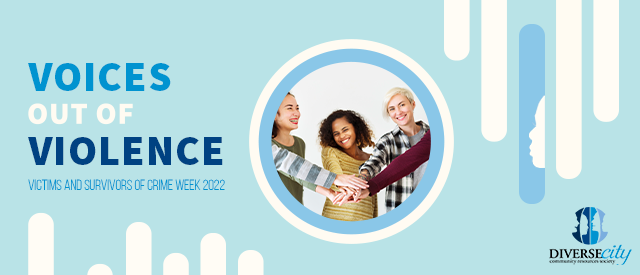Victims and Survivors of Crime Week (May 15–21, 2022): Discussing issues facing diverse victims of crimes and culturally safe resources and safety planning available to them
By Daniela Cohen
Migrant women are among the most vulnerable to experiencing gender-based violence. Yet their access to support is often filled with barriers. Recognizing that mainstream safety planning for gender-based violence survivors was missing a cultural perspective, DIVERSEcity created the Roots of Safety framework.
Roots of Safety helps immigrant and refugee women from different backgrounds to tap into their own cultural resources and develop a unique safety plan that empowers them to create their own goals.
Inspired by the Australian program Signs of Safety™, the framework involves mapping the client’s journey through a three-column approach: looking at concerns and complicating factors; using solution-focused questions and appreciative inquiry to come up with the women’s existing strengths and safety; and forming their own empowerment goals and next steps.
Cultural humility is a key value. “We want to break the myth that we know what’s best for them,” says Golnoosh, Roots of Safety training coordinator. “We want to make sure that we appreciate their knowledge about their own life, and we basically create a safe space for them to explore their own resources.”
As an example, Goolnosh says that where there is no immediate danger and women want to stay in the home, they can create a unique cultural map considering risk factors and protective factors rather than insisting on leaving as the only option.
A collaborative approach
The Roots of Safety framework uses non-blaming, non-shaming and non-judgmental language, naming the violent or abusive behaviour instead of labelling the person. This demonstrates an appreciation of the attachment between the partners and recognizes the opportunity for behavioural change. Through a collaborative process of appreciative inquiry and solution-focused questioning, women identity their own strengths and existing safety, which helps them identify their network, available resources and create empowerment goals.
“Sometimes when you’re so overwhelmed, stressed out or traumatized and you have been in survival mode, you can forget how strong and resilient you are, both in the relationship and also outside of it,” says Golnoosh.
DIVERSEcity uses the Roots of Safety framework in all of its Violence Prevention Services, as well as trains other service providers on how to apply it, too, including NISA Homes, ISSofBC, Muslim Food Bank, Burnaby Neighbourhood House, and Vancouver Island Counselling Centre for Immigrants and Refugees.
Started in 2019, DIVERSEcity also launched the survivor advisory panel, part of the Survivor-Centred Systems of Care Project, which provides training to women survivors of gender-based violence around the Roots of Safety framework and seeks their input to improve it. The panel currently has seven participants of diverse backgrounds who meet quarterly.
Afsoun, a DIVERSEcity clinical counsellor, who leads the survivor advisory panel, says that the panel has also provided a peer circle of support. “This is the power of the group. When you are all by yourself, you think ‘I’m the only one.’ But with sharing and listening to each other’s story, that is a way of empowerment.”
Resources for women survivors of violence
DIVERSEcity’s Survivor-Centred Systems of Care Project
DIVERSEcity’s Stopping the Violence Counselling for self-identified women
DIVERSEcity’s Multicultural Victims Services Outreach
DIVERSEcity’s It Happens Here Too… Sexual Assault Response Coordination Program
Surrey Women’s Centre
Contact a support worker at 604-583-1295
Fraser Health Crisis Line: 604-951-8855
VictimLinkBC
Toll-free, confidential, multilingual telephone service available 24 hours a day, 7 days a week. Call 1-800-563-0808 or email victimlinkbc@bc211.ca
Atira Women’s Resource Society
COVID-19 call-in line: 604-800-8881
Battered Women’s Support Services
Call 604-687-1867, text 604-652-1867 or email intake@bwss.org
Ending Violence Association of BC
Find resources and services in BC, and information on ending violence.
Nisa Helpline
Helpline assists Muslim women across North America seeking confidential, peer-to-peer counselling on a variety of issues. Call 1-888-315-6472.
Nisa Homes Vancouver
A safe haven and support services for women, with or without children, who are fleeing domestic violence, poverty or seeking asylum.
Tri-City Transitions Society
Women Against Violence Against Women: 604-255-6344
BC211 for referrals to other resources: Call 2-1-1
Transition Houses and Safe Homes from BC Housing
Vancouver Rape Relief and Women’s Shelter: 604-872-8212
Legal Aid BC
Legal information outreach workers (LIOWs) are Legal Aid BC staff can provide you with legal information and referral services
Embrace Clinic
The Embrace Clinic provides free short-term medical care to survivors of recent violence.
Note: For women who have experienced sexual assault, forensic exams at public hospitals are free of charge.

